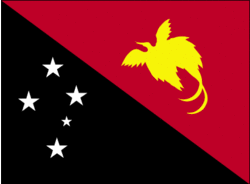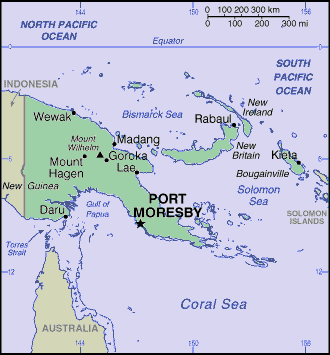This advice has been reviewed and reissued. The overall level of the advice has not changed.
SAFETY AND SECURITY
Terrorism
You should, be aware of the global risk of indiscriminate attacks which could be against civilian targets, including places frequented by foreigners. Please read "Security & General Tips" and "Risk of Terrorism when Travelling Overseas" pages of the FCO website for further information and guidance.
Crime
Serious crime is particularly high in the capital, Port Moresby, and in the cities of Lae and Mt Hagen. In particular, since September 2006, there has been an increase in serious incidents in Lae and on the road between Nadzab airport and Lae, between the one and ten mile settlement areas. Armed car jackings are common in all three cities as are robberies, including those that take place inside shops and restaurants. Firearms and bush knives (machetes) are the criminals’ weapons of choice.
Rape and gang rape are a serious problem across the country. It is particularly dangerous to walk after dark in most major towns. The situation is generally safer away from large towns.
-
You should avoid squatter (“settlement”) areas of towns
-
You should avoid public protests and disputes as these may turn violent
-
You should avoid carrying large amounts of cash or openly displaying expensive jewellery and electronic equipment
-
You should be vigilant at all times
Sporadic outbreaks of tribal fighting are a normal occurrence, especially in the Highlands Provinces, particularly the Southern and Western Highlands and Enga Provinces. Tribal fighters and criminals are becoming increasingly well armed through the trade in drugs for guns. Although outsiders passing through are not normally targeted, you should avoid travel in areas where there is tribal fighting. The rugged terrain and poor infrastructure limit the assistance that can be given.
The deployment of police reinforcements for the State of Emergency in the Southern Highlands Province has resulted in fewer police officers elsewhere in Papua New Guinea. Criminals may take advantage of the reduction in police personnel. You should therefore be vigilant and take necessary precautions.
Political Situation
On 1 August 2006, the Papua New Guinea government declared a state of emergency in the Southern Highlands Province. The Provincial Government has been suspended and an acting Provincial Administrator has been appointed. 700 police reinforcements, as well as soldiers are providing public order support from the Papua New Guinea Defence Force. You should exercise caution and avoid demonstrations and large crowds.
Local Travel
We recommend that you do not use public buses known locally as PMVs. There have been incidents of armed hold-ups of PMVs and of passengers being attacked and robbed of their personal belongings. There are occasional rape attacks on Port Moresby PMVs. Many PMVs are considered to be unroadworthy.
Highland Provinces, in particular the Southern Highlands and Western and Enga Provinces, are subject to inter-tribal disturbances without warning and you should exercise extreme caution, as law enforcement in these areas is weak. Please contact the British High Commission in Port Moresby for security updates.
Taxis are available in some major centres, but these can be badly maintained, and you should check about their reliability with your hotel or guesthouse. If you use a taxi, ensure that you agree a fare before getting into the taxi, irrespective of whether or not there is a meter. We recommend that family, friends or hotel courtesy buses should meet you when arriving at international or domestic airports.
If you intend to walk a trail or track, including the Kokoda Trail, we recommend that you travel with guides from a reputable tour company and pay the relevant fees prior to walking the Trail. Details can be obtained through the Papua New Guinea Tourism Promotion Authority (Tel: +675 3200211) or the Kokoda Track Authority (KTA) (Tel: +675 3255540). There have been serious attacks and robberies at both ends of the Kokoda Trail, most recently in October 2005. Although community leaders have assured tourists of their safety and well being while walking the Kokoda Trail, you are advised to exercise caution. WWII unexploded ordnance still exists in Papua New Guinea, particularly along the Kokoda Trail and at Milne Bay and Rabual.
Tavurvur Volcano in East New Britain erupted on 7 October 2006. The eruption affected travel in the area around Kokopo and Rabaul. You should check local media for updates on the latest travel situation in East New Britain, and travel in/out of the area.
Visitors to Bougainville Island should be aware that the Province has recently emerged from a period of separatist conflict. You must provide notice of your intention to visit the island to the Bougainville Provincial Administration (Tel: +675 973 9798), and must contact the Administration again upon arrival. The mountainous area in central Bougainville around the old Panguna mine is a ‘No Go Zone’. We strongly advice you not to enter the ‘No Go Zone’. Foreigners who have entered the Zone without authorisation from the PNG Government have been questioned, some for many days, by PNG authorities and had their passports withheld on departure from the Zone.
Road Safety
When driving, you must keep your driving licence with you at all times. You may use your United Kingdom or international driving licence for a period not exceeding one month.
Road conditions are generally hazardous throughout Papua New Guinea, and driving is commonly erratic. Drivers should take extra care, especially in the hours of darkness. Drivers who are involved in, or are witnesses to road accidents may find themselves at personal risk and should seek police assistance as soon as possible. Traffic drives on the left.
LOCAL LAWS AND CUSTOMS
As a general rule, you are prohibited from entering Papua New Guinea with fruit, vegetables and animal products due to local quarantine controls.
Marijuana and other narcotics are illegal in Papua New Guinea, and offences can carry substantial prison sentences.
Homosexual acts are unlawful. The penalty if found guilty could be imprisonment for a term not exceeding 14 years.
Murder may draw the death sentence although there is currently a moratorium on the death penalty.
ENTRY REQUIREMENTS
You should contact the Papua New Guinean representation in the UK for current advice. British nationals require visas to enter Papua New Guinea but tourists may obtain these on arrival for 100 Kina, (equivalent to less than £18), payable in local currency.
HEALTH
We strongly recommend that you obtain comprehensive travel and medical insurance before leaving UK. You should check any exclusions, and that your policy covers you for the activities you want to undertake, including cover for medical evacuation by air ambulance particularly if you plan to engage in adventure sports. Please see: Travel Insurance.
Medical facilities in Papua New Guinea are very basic. Hospitals often run out of basic drugs/supplies and suffer from power shortages. Evacuation by air ambulance to Australia is available in more serious cases. You should ensure you make provision for this in your insurance cover.
In May/June 2006 there was an outbreak of Whooping Cough (Pertussis) in East Sepik. This has spread towards Madang. The Papua New Guinea Government is responding to this with a vaccination programme.
Malaria is endemic in all areas outside of Port Moresby. More than three-quarters of British travellers who contracted malaria in 2005 did not take preventive measures, such as taking malaria prevention tablets. However, malaria can occur despite appropriate prevention, and therefore you should promptly seek medical care in the event of a fever or flu-like illness in the first year following your return from travelling to a malaria risk country. Before travelling you should seek medical advice about the malaria risk in Papua New Guinea.
Dengue fever is also common in coastal towns.
HIV/AIDS is a serious health issue with the rate of infection increasing. Other sexually transmitted diseases are prevalent in urban centres. Protection with condoms is essential.
Tuberculosis is also common in Papua New Guinea.
You should seek medical advice before travelling and ensure that all appropriate vaccinations are up to date. For further information on health, check the Departments of Health’s website at: www.dh.gov.uk
Avian Influenza
There have been no reported cases of avian influenza (bird flu) in Papua New Guinea during the current series of outbreaks. But the World Health Organisation (WHO) has confirmed cases elsewhere in the region.
You should read this advice in conjunction with the FCO’s Avian and Pandemic Influenza Factsheet, which gives more detailed advice and information.
NATURAL DISASTERS
Papua New Guinea is prone to seismic and volcanic activity, especially near Rabaul in East New Britain Province, Kimbe in West New Britain Province, and on Manam Island in Madang Province. Tavurvur Volcano in East New Britain erupted on 7 October 2006. The eruption has affected travel in the area around Kokopo and Rabaul. During October 2004, the Manam volcano started a major eruption. This resulted in complete evacuation of the island, which is presently uninhabitable.
You should not attempt to climb any of Papua New Guinea’s active volcanoes. Please contact the British High Commission in Port Moresby for updates.
GENERAL
If things go wrong when overseas, please see: What We Can Do To Help
We strongly recommended that you register with and seek the latest local advice from the British High Commission in Port Moresby on arrival. You should leave travel plans with friends, relatives or reliable local contacts. An electronic copy of a consular registration form can be obtained from the High Commission’s website at: http://www.britishhighcommission.gov.uk/papuanewguinea.
NB.
The British High Commission in Port Moresby does not issue passports. Applications for a new passport should be submitted to the High Commission for processing. Where possible, you are advised to apply at least four months before your passport is due to expire. You will be allowed to retain your old passport whilst waiting for the replacement to be processed and returned.
Urgent applications will be forwarded by commercial courier to the British High Commission in Canberra, and the courier cost will be added to the passport fee. You should be aware that our High Commissions will process your application as quickly as possible but, due to the distances involved, it is likely that there will be a delay in issuing you with a full replacement British Passport. Less urgent applications will be forwarded to Canberra via the Diplomatic bag free of charge.
In genuine emergencies the High Commission will issue an Emergency Passport. Emergency Passports are valid for a single journey back to the UK using agreed transit points as necessary, or to Commonwealth countries provided a prior arrangement exists with the authorities of the Commonwealth country concerned (for example, no such arrangement exists with Australia).
The High Commission will be able to advise you which of these options best suits your circumstances.
OTHER
Papua New Guinea Country Profile
 Papua New Guinean national flag (Flag of Papua New Guinea)
Papua New Guinean national flag (Flag of Papua New Guinea) Papua New Guinean map
Papua New Guinean map

 Search
Search Papua New Guinea country profile
Papua New Guinea country profile Travel advice for Papua New Guinea
Travel advice for Papua New Guinea